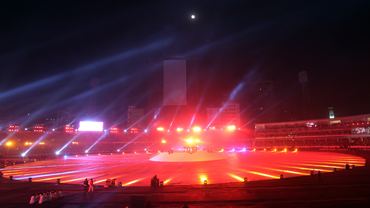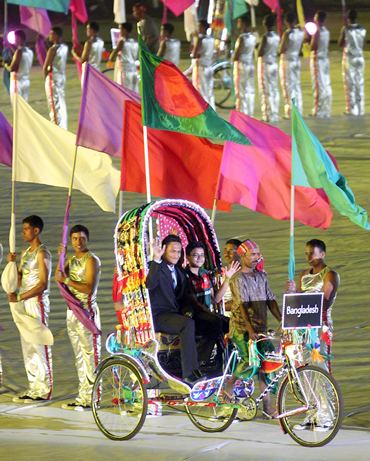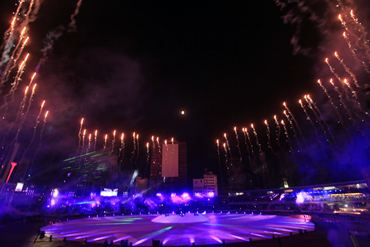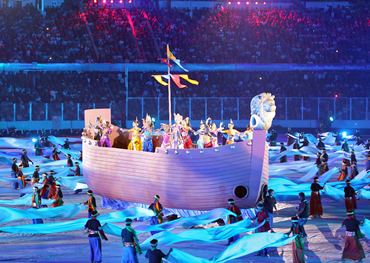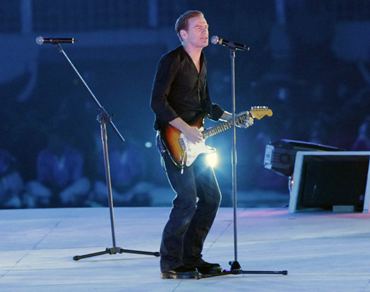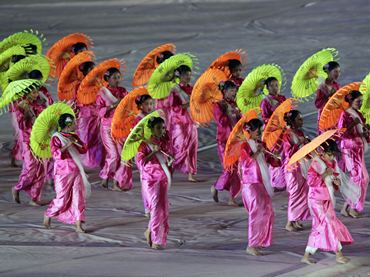 | « Back to article | Print this article |
High-voltage ceremony launches cricket World Cup
Beijing (Olympics) did it with aplomb in 2008.
New Delhi (Commonwealth Games) wasn't far behind last year.
And Guangzhou (Asiad) ensured China made a positive impact on the world stage for a second time in two years.
The onus was on Bangladesh now -- to put up an opening show that not only matched up to the expectations, but was also comparable to others.
The country had never hosted an event of this stature. The expectations, therefore, was limited.
So did the opening ceremony of the 2011 ICC World Cup at Dhaka make a mark?
The answer: a resounding YES.
Captains get tricycle ride
The focus of the opening ceremony, held at the Bangabandhu National Stadium on Thursday, was on emphasizing the culture and tradition of the co-hosts.
And it would suffice to say that it was a conceptual masterstroke.
While the opening ceremonies of the above-mentioned competitions focused too much on impressing the western world, the organizers in Bangladesh lay emphasis on their own country, and, to an extent, their neighbours.
So while on one end we had montages, tableaux, fireworks and audio-visuals emphasing the essence of the subcontinent, on the other we had musicians and dancers from these neighbouring countries perform in front of a spellbound audience, which witnessed captains of all the 14 participating nations get an unforgettable ride on tricycles.
Add the performance by Canadian legend Bryan Adams to that, and the two-hour show was all-encompassing.
Crowd treated to a musical extravaganza
Coming to the ceremony per se, it started with the Bangladesh national anthem (Aamar Sonar Bangla) after the dignitaries -- led by Prime Minister Sheikh Hasina were welcomed.
This was followed by an audio-visual showcasing the previous ICC tournaments and ending with this World Cup.
A welcome song by a group of young singers -- Ibrar Tipu, Elita, Kona, Mila -- to name a few, was followed by a series of speeches by the dignitaries.
And no sooner had the prime minister declared the ceremony open, by placing her hand on a palm scanner, than followed a series of cultural performances.
Spirit of cricket
While the evening commenced with eminent Bangladesh singers -- Mumtaz and Sabina Yasmin -- regaling the crowd with a medley of their chartbusters, our very own Sonu Nigam followed them on the dais, rendering the Spirit of Cricket number.
What though was greeted with a thunderous applause was the entry of the ever-popular Runa Laila.
The veteran singer cast a spell on the crowd with a bevy of numbers and by the time she belted out the chartbuster Dum-a-Dum Mastkalander, the crowd was already in a trance.
Superb cultural performances
Then followed a cultural programme depicting the Bengali language movement, the war of liberation (1971), the nation's founding father Bangabandhu Sheikh Mujibur Rahman's historic March 7 speech and a traditional dance involving the indigenous communities.
Among the performances by artists from the other countries, it was the Sri Lankan performers who impressed the most.
Night to remember
Then came the moment for which everyone was waiting for, with bated breathe.
As the performers rested on the sides of the ground, and an audio-visual regarding tourism in Bangladesh played on the giant screens, a Canadian singer was getting ready to hit the stage.
And when he did, he was greeted with a thunderous applause.
Bryan Adams might have landed in Dhaka with the news that his scheduled show in New Delhi (Feb 20) had been cancelled. However, he let none of that affect his performance, regaling the crowd with some of his chart toppers like Summer of '69, Let's make it a night to remember and 18 till I die.
No points for guessing, his performance was a super success.
Moment of glory for Bangladesh
The final performance of the evening involved the Indian music trio of Shankar-Ehsan-Loy.
The music directors of hit Bollywood flicks like Dil Chahta Hai, Kal Ho Na Ho and Kabhi Alvida Na Kehna, belted out the theme song, De Ghuma Ke, which has been composed by them.
And even as the crowd inside the stadium enjoyed every bit of the show, the crowd that had assembled outside too had a memorable evening, one to remember.
It is imperative here to reiterate that the emphasis on culture and tradition had worked wonders for Bangladesh.
It was a moment of glory for the whole country. They had delivered when not many had expected them to.

© Copyright 2025 Reuters Limited. All rights reserved. Republication or redistribution of Reuters content, including by framing or similar means, is expressly prohibited without the prior written consent of Reuters. Reuters shall not be liable for any errors or delays in the content, or for any actions taken in reliance thereon.
